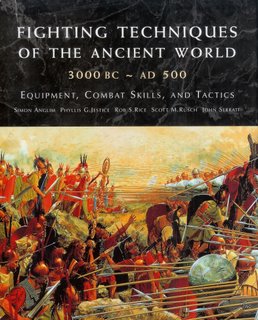SImon Anglim, et al.
 Anglim, Simon. Fighting Techniques of the Ancient World. New York, NY: Thomas Dunne Books, 2002.
Anglim, Simon. Fighting Techniques of the Ancient World. New York, NY: Thomas Dunne Books, 2002."Fighting Techniques of the Ancient World describes the fighting techniques of soldiers in Europe and the Middle East in an age before gunpowder. The book explores the unique tactics required to win battles with the technology available, and points out how little has changed in some respects of the art of war.
Divided into five chapters, the book first examines the individual components of an ancient army, the infantryman, archer, and the mounted soldier, the equipment they wore and used, and how they fought together in units on the battlefield. Fighting Techniques of the Ancient World describes why certain types of unit-like the Greek phalanx and Roman legion-were more effective than others and how their tactics evolved over time, illustrated with references to key battles. The third chapter discusses how these u nits were used together on the battlefield, how commanders controlled their men in the heat of battle, and the importance of a general correctly disposing his troops before the fighting began. This chapter also includes a discussion of naval commanders and their tactics. The fourth part of the book looks at the specialist techniques and equipment developed for siege warfare in the ancient world, with examples of classic battles like Julius Caesar's victory at Alesia and illustrations of catapults and other siege engines. Finally the last chapter covers naval warfare in the ancient world, from the ships in which the men fought to the weapons they carried and the major battles of the period.
Using specially-commissioned color and black-and white artworks to illustrate the battles, equipment, and tactics of the era, Fighting Techniques of the Ancient World shows in detail the methods by which armies, including Assyrians and Roman forces, prevailed over their foes, and why other armies were less successful. The book is an essential companion for any reader interested in warfare in the classical age."


0 Comments:
Post a Comment
<< Home